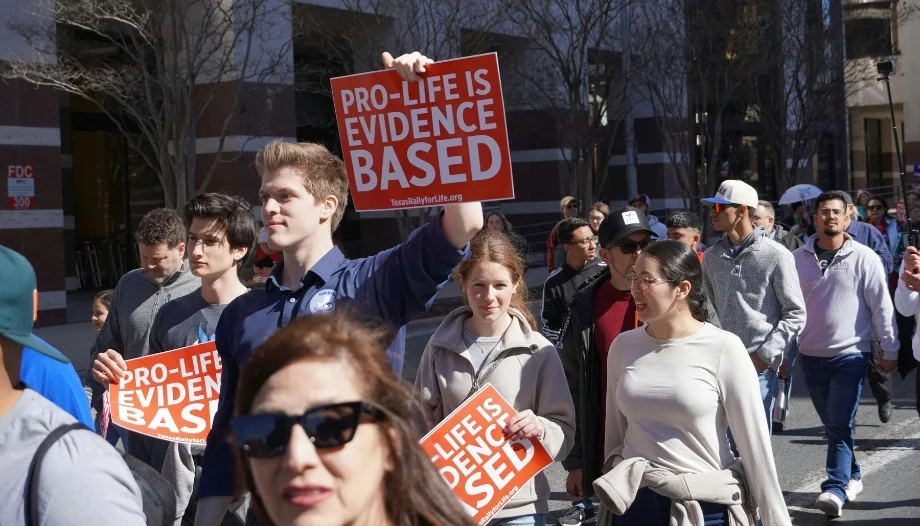Considering the recent debates within the Lithuanian Parliament over abortion legislation, I’ve observed a recurring assertion that strikes me as both intellectually lazy and morally evasive: that abortion should be banned because it conflicts with religious beliefs.
This framing is not only reductive but also dishonest. It implies that the pro-life position is inherently religious, a relic of dogma rather than a conclusion drawn from reason, ethics, or a consistent philosophy of human value. What is worse, this assumption is often weaponized by those on the opposing side, who paint anyone with pro-life convictions as a religious fanatic or a zealot waging war on women.
Religious beliefs are not the foundation
To argue that a belief must be dismissed because it is shared by a religion is a fallacy of the highest order. Atheists exist who reject abortion not because of divine command, but because they hold, through reason, that life has intrinsic value. Are they to be accused of secret piety? Are we to discard their arguments because they do not fit neatly into a religious narrative?
Reducing the pro-life argument to a matter of faith alone is not only a disservice to the debate, but also an abdication of moral responsibility. It is easier to dismiss a conviction as “religious dogma” than to confront the logic, the ethics, and the uncomfortable questions it may raise.
To call the defence of life a “religious issue” is to attempt to discredit a moral stance without engaging its substance. It is not only weak labelling; in my view it is intellectual cowardice.
Are the Foundations of being Pro Life Religious?
The foundational pro-life argument is grounded in biology (when human life begins), ethics (the value of human life) and the virtue of justice (the moral and innate obligation to protect the innocent and powerless). None of these aspects require a belief in God to be accepted.
Yes, it is true that many in the pro-life movement are religious. So what? That’s not the point. When did a movement’s demographics start determining the truth or legitimacy of its principles? We don’t dismiss the civil rights movement as a religious crusade, even though many of its leaders such as Dr Martin Luther King foremost among them, were pastors. We don’t write off environmentalism because many its adherents speak of nature in emotional and personal terms. Why then is the pro-life cause uniquely singled out by having its moral seriousness reduced to mere religious sentiment?
Did the Pro-Life movement start for religious reasons?
Even if the early pro-life movement had strong roots in religious communities (which is a complex and contested historical point), that still tells us nothing about the merit of its arguments. The truth of an idea does not depend on who said it first, or why.
If Einstein had been a priest, would the theory of relativity be theological? If a religious person says stealing is wrong, is the moral weight of that position nullified by their faith?
This line of reasoning, tracing the origin of an argument to discredit it, is known as the “genetic fallacy”. It’s the same type of reasoning used by those who say “democracy is a Western idea” to reject it in non-Western societies. It’s lazy, shallow, and irrelevant to the content of the argument itself.
Why This Mislabelling Matters
Words shape perception and perception shapes discourse. Calling the pro-life position a "religious issue" isn't just a matter of categorization; it is a way to distort the nature of a discussion before it even begins. Labelling pro-life convictions as "religious" marginalizes the argument from the outset. It removes it from the realm of public ethics and places it within the private realm of faith, as if it were no more relevant to policy than a personal dietary preference. It trains people to see a deeply moral, societal issue as the personal opinion of “a few pious people" and thus, suggests that this conversation applies only in churches, not in courts or parliaments.
My concern is that this mischaracterization teaches people, especially the young and those outside religious circles, that unless you belong to a specific faith, you have no reason or right to hold a pro-life view. It suggests that caring about the unborn life is only for the religious, shutting out thoughtful individuals who might reach the same conclusion through reason, ethics, or personal conviction. It turns a universal moral issue into a tribal badge. And in doing so, it shuts the door on thousands of thoughtful individuals who might otherwise engage the issue seriously.
Worse still, it leads to a kind of argumental apartheid, where certain perspectives are excluded from legitimate public debate not because they are false or harmful, but because they are perceived to belong to “the wrong kind of people”. In a certain sense it can also lead to intellectual segregation since it may promote the moral view that certain beliefs are less worthy of engagement simply because of who holds them.
This mislabelling also impoverishes the pro-choice side of the debate. Since by refusing to engage seriously with the strongest pro-life arguments, which is rooted in biology, ethics, and justice, many who call themselves pro-choice end up arguing against a strawman. They debate an imagined theocracy instead of a real philosophy. They ridicule their idea of cartoonish villains instead of grappling with rigorous reasoning. And as a result, the entire conversation stagnates.
A functioning society cannot afford to treat fundamental moral questions as niche theological squabbles. We do not relegate questions of war, racism, or poverty to the religious domain simply because many religious people have strong views about them. We don’t say opposition to racism is a "religious issue" just because churches supported the 1965 Selma marches to secure voting rights for African Americans. We don’t claim that caring for the poor is invalid because it echoes Biblical principles. We understand, rightly, that these are not sectarian concerns, they are public, civic, and deeply human issues.
So why not life?
Why is the question of abortion, arguably one of the most profound moral issues of our time, singled out and cordoned off by being dismissed as the territory of “the religious”? If human dignity matters, if justice for the vulnerable matters, if ethics and compassion and reason are values, we hold dear, then we owe it to ourselves, and to one another, to engage this question with honesty, not with labels.
The value of human life is not a denominational concern. It is not Catholic or Protestant, Muslim or Jewish, spiritual or secular. It is universal. And any society that hopes to be just must treat it that way. This is not a “religious issue”. This is a human one. And it deserves to be treated with the seriousness and moral clarity that all human issues do.
Founder of "Catholicism Coffee".







